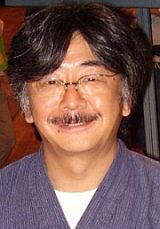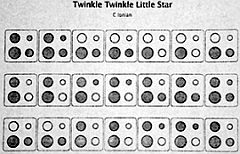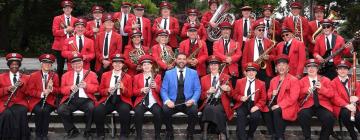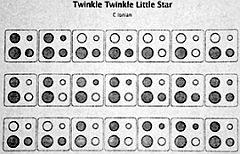- A sold-out Davies Symphony Hall where I could find only four people over 50 who were not employees or ushers. Almost everyone was under 35.

Nobuo Uematsu - A living composer, present in the audience, who received multiple ovations, almost all of them louder than the “merely” enthusiastic applause for the performers.
- A plethora of iPhones, many of which were blown into by their owners to play Twinkle, Twinkle, Little Star after the concert.
I kid you not. The “Summer and the Symphony” series concert called “Distant Worlds: Music From Final Fantasy,” featuring music by Nobuo Uematsu arranged and conducted by Arnie Roth, was something to behold. Conceptually, it was an event of promise, in many respects, for the future success of symphonic concerts.
In case you’re not aware, Final Fantasy is a set of computerized role-playing games for which Uematsu wrote much of the music. The first game was released in 1987, and a 14th member of the series is due out next year. Needless to say, the games have developed quite a following over time, and you can imagine the pleasure that fans would experience hearing a live orchestra perform tunes they have heard over and over again while fighting enemies and otherwise participating in game events.
Although concerts of film music have existed for many decades, symphonic game-music concerts — a similar concept — are a fairly new phenomenon, having begun as recently as 2003. They have proved a great draw, and present the potential of luring younger audiences into concert halls where, by hook or crook, they could be exposed “to the classics” and eventually become regular concertgoers ... or so goes the theory. If such evolves, some concert conventions may change along with the audiences.
A Medium Calling for Greater Talent

While the music was played, segments from the video games were projected on a large screen. The increasing sophistication of the graphics over time was apparent: Earlier versions of the game elicited hearty laughs from the audience as it was reminded of the relative crudity of the earlier iterations. What impressed me in the latest versions is the detailed rendition of separate strands of hair and the effects of wind. The profundity of the plotlines and metaphors for life provided by the games are best left to aficionados to articulate for themselves.
As for the postconcert twinkle of iPhones, musical “scores” were offered to the hundred or so who gathered in the front of Davies Symphony Hall, and a lesson on how to play an iPhone equipped with Smule software was provided (see here for an example of the sound). This technological development also presents promise, for the future of music depends on people making music, not just passively experiencing it. The more who do so, the better.

